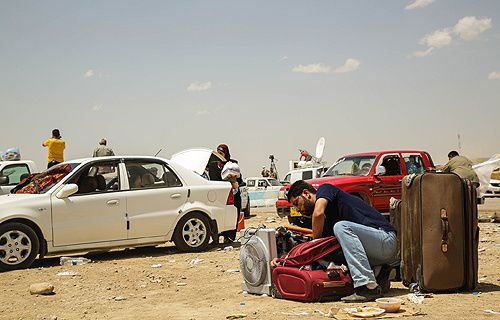Catholic Relief Services and Caritas have agreed to a common plan to help those who have fled from their homes in the portions of northern Iraq now controlled by the Islamic State. The militant Sunni Islamist organization Islamic State of Iraq and the Levant was among the rebels fighting in the Syrian civil war; this spring it spread its operations to Iraq, taking control of Mosul and swaths of territory in the country's north and west. It has now declared a caliphate, and calls itself the Islamic State. All non-Sunni persons in the Islamic State have been persecuted — Christians, Yazidis, and Shia Muslims have all fled the territory. In response to the crisis, Catholic Relief Services — the U.S. bishops' international charity arm — and Caritas have identified short and medium-term priorities to help minorities, most of them Christian, who have fled the Islamic State, after conducting a survey of 25 displaced families staying in schools, churches, empty houses, with host families, and in rental accommodations. “Most are uncertain about the future, but do not see themselves returning home any time soon,” explained Kris Ozar, head of programming for CRS Egypt, in an Aug. 4 interview with CNA. “The level of psychological trauma is high, especially among minorities, who were more directly targeted by the violence.” Thousands of Christians and other minorities fled Mosul after a July 18 ultimatum demanding they convert, pay jizya, or be killed. They went to other towns in Nineveh province and in Iraqi Kurdistan. Many were stripped of their possessions at Islamic State checkpoints, escaping with nothing but the clothes on their backs. “Many of these families had first fled Mosul in June, but recently returned under the impression that it was safe to do so, making the latest displacement even more traumatic,” Ozar recounted. “Humanitarian conditions in the country continue to deteriorate,” he said, adding that “population displacement is widespread but highly fluid, with little reliable data on overall numbers at any time.” “With CRS and Caritas Germany co-funding, Caritas Iraq responded to the Mosul crisis by distributing essential food and non-food items to 2,000 displaced families by the end of June,” Ozar said. The package included 10 days’ worth of food and essential bedding and hygienic supplies. “In response to the new wave of displacement from Mosul in mid-July, Caritas Iraq distributed a similar package of food and non-food assistance to another 400 newly displaced partners.” As a result of the survey of displaced families, CRS and Caritas decided to focus immediately on education and psychosocial activities for internally displaced children, in addition to ongoing relief for new arrivals. “The Ministry of Education requested immediate assistance to ensure that all children are able to take their end of year exams in mid-August” since many children have “missed weeks or months of school and need help to catch up on their classes,” Ozar explained. “So CRS and Caritas will help students at grades 9 and 12 to catch up on their classes before the exams.” The assistance to children will also include psychosocial support and healing, given the scale of emotional trauma suffered. In the heavily affected areas of Nineveh province, CRS and its partners are working to reach as many as 3,500 families with food, water, and essential living supplies. “With people on the move and robbed of their belongings, many have no means to purchase the basics just to get by.” Caritas and CRS are also preparing to support longer-term resettlement with winterization, shelter, and livelihood support. In addition to the assistance offered by CRS and Caritas, Aid to the Church in Need has donated $134,000 to the Church in Iraq; the Congregation for the Oriental Churches has sent $50,000, and the Pontifical Council Cor Unum gave $40,000. Inhabitants of Mosul who have fled to other locations in Nineveh province, such as Bakhdida, lack drinking water, electricity, and medicine, the Islamic State having cut off their supplies. On Aug. 3, the Islamic State took control of Sinjar, a Yazidi-majority town fewer than 80 miles west of Mosul. The Yazidi are an ethno-religious minority, most of whom live in Nineveh province. Much of the town's population of 20,000 have abandoned their home for Dohuk province, part of Kurdistan.

